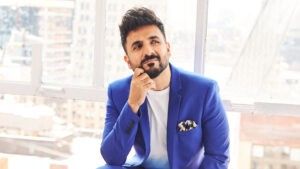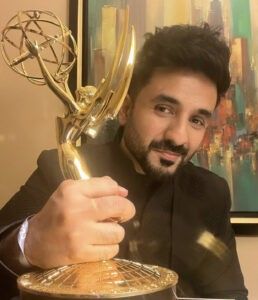A PATH-BREAKING journey in live comedy led Vir Das towards winning an International Emmy award in November. That glittering honour for his Netflix special, Vir Das: Landing, added to global acclaim for India’s most popular English-language stand-up star.
Instead of basking in that glory, the cool comic has been busy with a mammoth world tour of his latest show, Mind Fool, which is taking him to 33 countries, including shows across England in December. The laughter-filled show about the challenges of adulting has added to others that have played to sold-out live arenas, including the Eventim Apollo in London on Friday (15).
Eastern Eye caught up with the Indian funny man to speak about his Emmy win, the brilliant new show, comedy, the importance of baby steps and the best advice he would give those following in his footsteps. He peppered many of his answers with infectious laughter.
Have you gotten used to the fact that you’re making such a big global impact?
Not at all. (Laughs) I’m barely dealing with jet lag at this point. My life is entirely about baby steps, and always has been. To me, it’s about making the joke work, or who is in this room of people. And can I make sure they have a good time tonight? So, I’m not really thinking about the globe as much as I am just booking airline tickets for it.

But I wouldn’t describe your recent International Emmy win as a baby step. How much does it mean to you?
It means a lot, in terms of me being an Indian comedian receiving it. There’s a world opening up to Indian stories, and that is a special feeling of home. So, in that sense, I’m very proud. I’m hoping it’s the first of many awards for Indian comedy in that sense.
Where is the award?
It’s on the desk, and it’s nice to look at it. In that sense, it doesn’t change what I have to do on stage, if I’m being honest. When you turn up at my show, I kind of put you on a pedestal, and were I to be thinking about an Emmy award in that moment, it would make my life a lot more difficult. So, I still have to make an ass of myself.
But how do you feel about so many English-language comics from India who are following in your footsteps?
I think it’s language-agnostic at this point. I was just at the International Emmys, where it was nice to see that I was nominated with an Irish comedy, but also an Argentinian one and another from somewhere else. I think there’s great Hindi and regional language comedy as well. So, it’s never been a better time to be a comic.
Tell us more about that.
You know, you can have 10 minutes of material, and put it up online, and get 30 million views. And then 300 people will come and see you. In our time, you had to do a movie so that people would understand what your name was and come see you do stand-up. So, it’s just nice to be able to find your people. That’s the privilege.
What inspired your latest show, Mind Fool?
Mind Fool is a show about not knowing how to adult, basically. I think most adults are kids who are pretending to have their sh*t together. There seems to be this glorified human chapter on adulting that I seem to have skipped in my life. So, I just kind of ended up writing about not having my sh*t together. I don’t know how to be an adult and suspect that I’m not alone. So, it’s just me seeking out other idiots.
Is it a very personal show based on your own experiences?
Well, there is a kind of decent midpoint to the show. The first half of the show is very much about the world we live in. And kind of equally relying on comedy and discomfort, if you will. Then the second half of the show is the storytelling half. And that’s very much relying on comedy and comfort. So, I like to think that’s the arc of the show.
Does this mean that you’re steering away from politics?
Well, I think you’d have to come to the show to see everything. There’s a lot of satire in it. I definitely think we’re going to talk about the world. And that means, for sure, we’re going to talk about power.
We have adopted you as a Brit now. How much does performing in the UK mean to you?
I mean, I started out in the basement of Soho theatre (in London), which I think was a 90-seater room. My first Edinburgh show was, I think, six people at a venue near a train station that smelled like sewage.
Now, it’s kind of nice to say, we sold out every show at the Fringe and have sold out the Apollo. But I’m still with Soho theatre with whom I began my journey. I’ve grown with them, and now there are 4,000 people coming to see us in London. Having the same people that you started with is just absolutely amazing.

It’s amazing that your posters are there with international comedians at an iconic venue like Soho theatre in London…
Yeah, they’ve been my guys from the start. They gave me my first break in the UK and took me to the Fringe for the first time. So, that venue means the very world to me. I still perform there all the time. I love calling them up and just being like, I’m in London for two weeks and have new material. Let’s go do a trial show. And I love the vibe of a basement room. Don’t get me wrong, the Apollo with 4,000 people is fantastic. But there’s also nothing quite like a 90-person basement.
Do big venues and being successful mean more pressure for you?
I feel pressure before every show. But it’s a different kind of pressure. I’m confident in my craft. I do take pressure from people getting babysitters, saving for months and tickets selling out months in advance. That means they made plans three, four months in advance. And in a city like London, they have serious options for a Friday or Saturday night. So, in that sense, I like to believe in the promise of my shows sending you home flying on a cloud. I have to deliver on that. So, that is a pressure I definitely take.
You’re taking the show on a mammoth world tour. How did you decide on which countries to go to?
The first world tour was like maybe 15 countries. But you just kind of keep looking at the map and saying, where haven’t we gone yet? Oh, we’ve never been to South America. Fine, let’s do Brazil and Peru. In the east, we’ve only ever done Singapore; let’s do Malaysia, Japan and a couple of other places. We’ve never done Africa, so let’s do Cairo, Lagos and maybe Nairobi. So, it’s just kind of looking at where you’ve been before and adding more. You know, having 1.6 billion people (Indians) does not hurt. Being on Netflix definitely helps as well.
Is there a favourite country that you have visited?
I like rooms more than countries. So, I love a comedy cellar in New York and also the NCPA auditorium in Mumbai. There are rooms that I genuinely love. I don’t think it boils down to countries. Now, thankfully, one is at the point where, hopefully, people are coming to see you, do you, and be authentically you. In that sense, you’re not really performing for different countries, you’re performing to different rooms.

You have made all the right moves. What’s the master plan going forward?
Same thing. Just baby steps, man. I don’t think about the big picture. I just think about what’s right in front of me. And how can I make it hilarious. That’s the plan.
You’re also a very good actor, but is stand-up now taking priority?
Well, no, it’s more of an acting year. It kind of goes from year to year. When I was writing Vir Das: Landing, I knew I had to get that show right. I ended up doing like 160 shows that year because I knew it was going to end up on Netflix. It was going to be my fourth special, and I wanted it to be a decent piece of work. But I just wrapped up two series for OTT platforms. I start a movie in February. So, this is going to be an acting year.
As a strong role model, what advice would you give to aspiring comics?
The same advice I give to all artists which is that they have to know you. When they know you, they will come back for you. Anyone can make people dance and laugh. But can you, in the first two and a half minutes of your show, make people feel like, ‘Oh, he let me into a window of who he or she is’. And at the end of the show, can they feel like they’re friends with you? If you can achieve that, I feel like they will always come back and grow with you in the different phases of your life.
You are always really honest on stage. But do you sometimes feel that you’re revealing too much about yourself?
No, I don’t! (Laughs) What danger is there in revealing too much about myself? I don’t think it’s any information that’s useful to anybody beyond a certain point. I like the fact that there is an emotional connection with the audience, you know. I like the fact that, hopefully, what you remember is that he left 600 per cent on the stage, if nothing else.
Are you going to make a new year’s resolution?
Hell no, not at all. I’m having sugar on New Year’s Eve. I’m doing an action movie in February. And my one cheat day is New Year’s Eve, where I gotta have some sugar. So, I’m just looking forward to it.
Are you going to carry on being fearless?
I am hopefully going to be as honest as I’ve always been. And the only thing I will be afraid of, is my audience not being satisfied.
